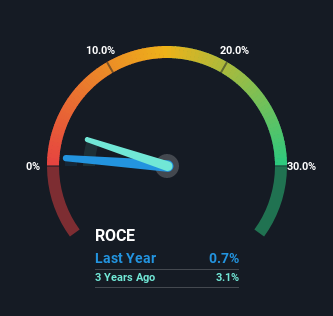- United States
- /
- Hospitality
- /
- NYSE:LTH
Some Investors May Be Worried About Life Time Group Holdings' (NYSE:LTH) Returns On Capital

What underlying fundamental trends can indicate that a company might be in decline? Businesses in decline often have two underlying trends, firstly, a declining return on capital employed (ROCE) and a declining base of capital employed. Basically the company is earning less on its investments and it is also reducing its total assets. Having said that, after a brief look, Life Time Group Holdings (NYSE:LTH) we aren't filled with optimism, but let's investigate further.
Understanding Return On Capital Employed (ROCE)
For those that aren't sure what ROCE is, it measures the amount of pre-tax profits a company can generate from the capital employed in its business. Analysts use this formula to calculate it for Life Time Group Holdings:
Return on Capital Employed = Earnings Before Interest and Tax (EBIT) ÷ (Total Assets - Current Liabilities)
0.0074 = US$45m ÷ (US$6.6b - US$457m) (Based on the trailing twelve months to December 2022).
Therefore, Life Time Group Holdings has an ROCE of 0.7%. Ultimately, that's a low return and it under-performs the Hospitality industry average of 10%.
See our latest analysis for Life Time Group Holdings

In the above chart we have measured Life Time Group Holdings' prior ROCE against its prior performance, but the future is arguably more important. If you'd like, you can check out the forecasts from the analysts covering Life Time Group Holdings here for free.
SWOT Analysis for Life Time Group Holdings
- No major strengths identified for LTH.
- Interest payments on debt are not well covered.
- Expected to breakeven next year.
- Good value based on P/S ratio compared to estimated Fair P/S ratio.
- Debt is not well covered by operating cash flow.
- Has less than 3 years of cash runway based on current free cash flow.
What The Trend Of ROCE Can Tell Us
In terms of Life Time Group Holdings' historical ROCE movements, the trend doesn't inspire confidence. To be more specific, the ROCE was 3.1% three years ago, but since then it has dropped noticeably. And on the capital employed front, the business is utilizing roughly the same amount of capital as it was back then. This combination can be indicative of a mature business that still has areas to deploy capital, but the returns received aren't as high due potentially to new competition or smaller margins. So because these trends aren't typically conducive to creating a multi-bagger, we wouldn't hold our breath on Life Time Group Holdings becoming one if things continue as they have.
What We Can Learn From Life Time Group Holdings' ROCE
All in all, the lower returns from the same amount of capital employed aren't exactly signs of a compounding machine. However the stock has delivered a 18% return to shareholders over the last year, so investors might be expecting the trends to turn around. In any case, the current underlying trends don't bode well for long term performance so unless they reverse, we'd start looking elsewhere.
Life Time Group Holdings does have some risks though, and we've spotted 1 warning sign for Life Time Group Holdings that you might be interested in.
For those who like to invest in solid companies, check out this free list of companies with solid balance sheets and high returns on equity.
New: AI Stock Screener & Alerts
Our new AI Stock Screener scans the market every day to uncover opportunities.
• Dividend Powerhouses (3%+ Yield)
• Undervalued Small Caps with Insider Buying
• High growth Tech and AI Companies
Or build your own from over 50 metrics.
Have feedback on this article? Concerned about the content? Get in touch with us directly. Alternatively, email editorial-team (at) simplywallst.com.
This article by Simply Wall St is general in nature. We provide commentary based on historical data and analyst forecasts only using an unbiased methodology and our articles are not intended to be financial advice. It does not constitute a recommendation to buy or sell any stock, and does not take account of your objectives, or your financial situation. We aim to bring you long-term focused analysis driven by fundamental data. Note that our analysis may not factor in the latest price-sensitive company announcements or qualitative material. Simply Wall St has no position in any stocks mentioned.
About NYSE:LTH
Life Time Group Holdings
Provides health, fitness, and wellness experiences to a community of individual members in the United States and Canada.
Solid track record with reasonable growth potential.

